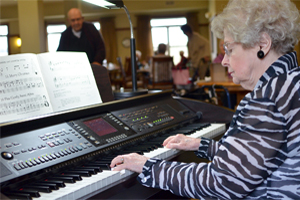As we age, cognitive health becomes important for well-being. For individuals diagnosed with Alzheimer’s disease or other forms of dementia, the progression of cognitive decline can be challenging – not just for the person affected, but also for their loved ones. Memory care communities are specifically designed to support people with memory loss, and one of their benefits is the ability to help slow the progression of cognitive decline through structured environments, personalized care, and activities.
A Purposeful Environment that Promotes Safety and Familiarity
Memory care facilities are intentionally designed to reduce confusion and stress. From color-coded hallways to marked common areas and private rooms, the layout helps residents navigate their surroundings more easily. This sense of familiarity can reduce anxiety, which is known to worsen cognitive impairment.
In addition, these environments minimize distractions, helping residents focus better during daily routines or activities. Simple elements – like natural lighting, quiet spaces, and secure outdoor areas – can support mental clarity and emotional stability.
Routine and Structure Create Cognitive Engagement
Daily routines are important in memory care. Predictable schedules help people feel more in control and reduce the cognitive load that comes with making decisions. Staff members use consistent cues and reminders to help residents transition between activities like meals, exercise and rest.
This structured approach doesn’t just create comfort – it also stimulates memory. Repeating tasks, such as setting the table or participating in a morning stretching class, reinforces natural pathways and can improve day-to-day functioning over time.
Therapeutic Activities that Strengthen the Mind
Memory care communities offer a range of cognitive therapies and activities designed to stimulate brain function. These may include:
- Art and music therapy: Creative expression can spark memories, emotions, and strengthen neural connections.
- Reminiscence therapy: Talking about the past helps residents connect with long-term memories and boosts their sense of identity.
- Brain Games and Puzzles: Simple games challenge thinking and memory recall, promoting mental agility.
- Physical Exercise: Regular movement improves blood flow to the brain and supports overall cognitive function.
Participating in these activities encourages residents to use different parts of their brain, which can help slow decline and maintain skills for longer periods.
Trained Staff Who Understand Memory Loss
One of the most impactful aspects of memory care is the staff. Caregivers receive training in dementia care, learning how to communicate effectively, recognize behavioral changes, and provide support specific to each resident’s needs.
By addressing emotional and psychological well-being along with physical care, staff create an atmosphere where residents feel respected, understood, and safe – a foundation for cognitive stability.
Social Connection and Emotional Support
Isolation can speed up cognitive decline, which is why social interaction is important for memory care. These communities offer group activities and shared mealtimes that encourage connection among residents. Friendships, laughter, and conversations provide stimulation and emotional enrichment that are proven to benefit brain health.
More importantly, residents feel a sense of belonging, which reduces depression and anxiety – two conditions that are often associated with faster cognitive decline.
Conclusion
While no environment can completely stop the progression of dementia, memory care communities offer a unique blend of structure, engagement, and support that can slow cognitive decline. By surrounding individuals with trained caregivers, therapeutic activities, and a thoughtfully designed setting, these environments provide a higher quality of life and a greater sense of dignity for those with memory loss.
Whether you are considering memory care for a loved one or simply want to understand the benefits, knowing how these environments support cognitive health can be a reassuring step forward.






